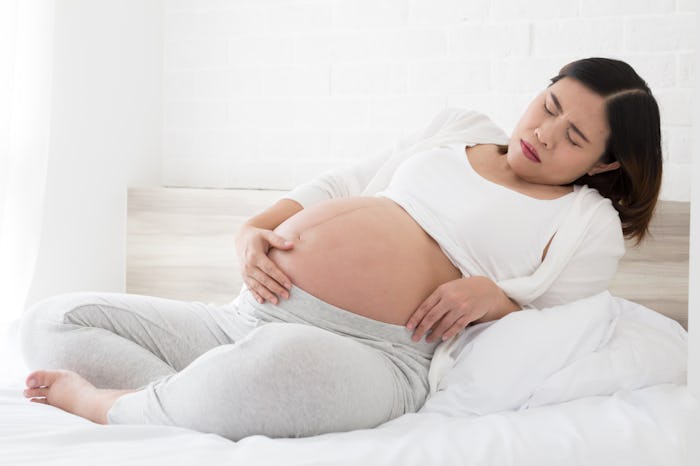Life

Here's What You Should Know If You Go Into Labor During A Hurricane
Labor in and of itself can be a stressful, intense event. But for many moms-to-be, their reality and impending labor is more intense than they ever thought, and there's nothing they can do about it. With the number of hurricanes hitting the coast this season, the scary fact is that some women will go into labor in the middle of a terrifying storm. Luckily, as is the case for every family in a hurricane's path, being prepared can put the odds in your favor. Asking what to do if you go into labor during a hurricane is a scary yet necessary question for all expecting moms to think through, so that you and your baby can stay as safe as possible during the storm.
No woman expects her labor to happen during a dangerous storm, but in some areas, it's a reality that must be prepared for. According to BabyMed, the common myth that hurricanes can cause women to go into labor is likely just that — a myth — yet some women will go into labor naturally or via induction during a hurricane. These expert-recommended natural disaster safety steps will help you plan ahead in case your baby decides to make a stormy entrance.
1Stay In Close Contact With Your Doctor
The American Public Health Association (APHA) noted that pregnant women should be in constant communication with their health care providers as a hurricane approaches. Whether you're actively in labor or not, it's a possibility that should always be considered, and OB-GYNs and pregnant women should have a plan in place so that they're not blindsided by the storm.
2Have Your Bag Packed And Ready
Every pregnant mom is instructed to have her hospital bag packed before her due date, but women in the path of a hurricane should have theirs ready even sooner.
3Know The Signs Of Early Labor
The American Congress of Obstetricians and Gynecologists (ACOG) recommends that, in the event of a natural disaster, OB-GYNs make sure their patients know the signs of early labor. With the likelihood of a natural disaster, it's even more important for women to pay attention to their bodies and know the signs of early labor well. According to What to Expect, the most common signs are increased back pressure and pain, vaginal leaking, light contractions, and of course, your water breaking.
4Stock Up On Essentials
The APHA also noted that stocking up on essentials like water, non-perishables, wipes, diapers, and other things you know you'll need is imperative. Furthermore, they add that pregnant women should stock up on emergency birth supplies: clean towels, sharp scissors, an infant bulb syringe, medical gloves, two white shoelaces, sheets and sanitary pads, and two blankets.
5Learn Your Hospital's Emergency Protocol
Each hospital should have its own protocol in place about what to do in the event a hurricane hits. As scary as it may be to talk about, you can actually take comfort in the fact that your healthcare providers have established a plan.
6Do NOT Ignore Emergency Evacuation Orders
As per the APHA's protocol, even if you think you'll be safer at home, if your area is evacuated, do not ignore that evacuation.
7Try To Get To The Hospital As Early As You Can
Of course, there's no telling when exactly you'll go into labor, but if you're due date is around the same time as the storm, your doctor may talk to you about an induction to get the ball rolling sooner rather than later. According to The Palm Beach Post, most hospitals will allow mothers who are 38 weeks gestation or more to pre-register to ride out the hurricane at the hospital.
On the other hand, if you start noticing early contractions, don't hesitate to go in before the storm hits and wait where you know you'll have the help you need.
8If You Go To A Shelter, Tell The Person In Charge About Your Condition Right Away
If you have to relocate, the APHA advised that you take responsibility for your situation and speak up to the person in charge right away. Chances are they will be able to find someone to help you.
9Be Prepared To Protect Yourself
If you can't get to a hospital, make sure you're physically protected. "If you are not in a hospital setting and at home or somewhere unfamiliar, you need to avoid things that can [hurt you during] a hurricane, [like] wind and flooding," OBGYN Chase Cawyer, M.D. told Fit Pregnancy. "To avoid the problems associated with wind, build a barricade so when things are flying they don't hit the patient or partner. To avoid flooding, try to find a higher floor so [you] aren't scrambling to higher ground with a newborn."
10Know What To Do If You Can't Leave Your Home
It can't help to be informed ahead of time about what to do if you have to give birth at home. Harvard Medical School offers a clear guide to delivering at home in emergency situations.
More resources:
The Mother to Baby Pregnancy and Natural Disasters Fact Sheet
The APHA Disaster Kit Guide for Pregnant Women & Families With Children
APHA Hurricane Preparedness Guide for Pregnant Women
Check out Romper's new video series, Romper's Doula Diaries: